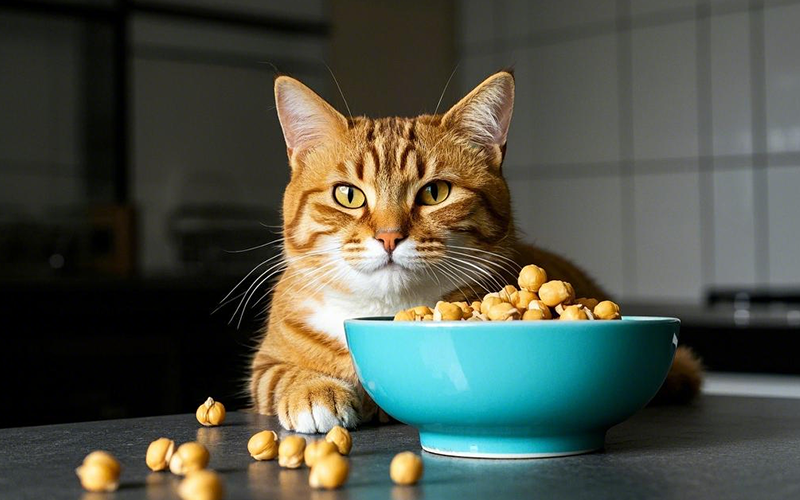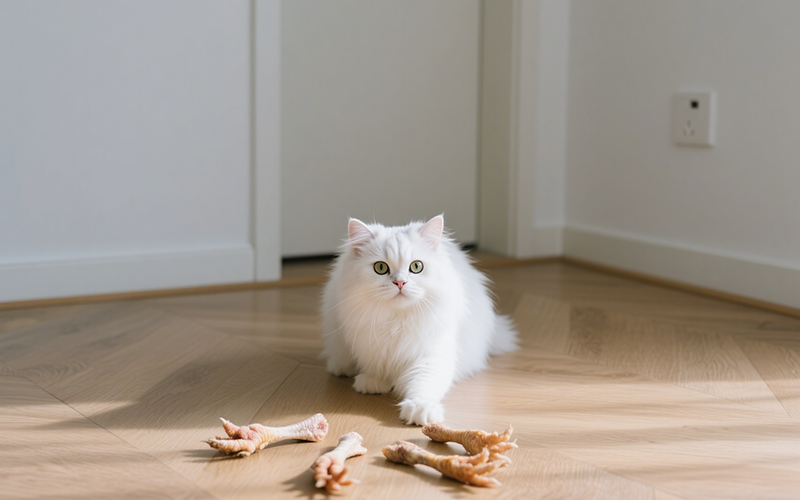Can Cats Eat Chickpeas? Understanding the Safety of Feeding Your Feline Legumes
- 12 Mar 2025 13:47
As cat owners, we’re often curious about what foods we can share with our pets, especially when it comes to healthier options like chickpeas. Chickpeas, or garbanzo beans, are a popular legume known for being rich in protein, fiber, and nutrients. But the question remains: Can cats eat chickpeas? Let’s explore the pros and cons of feeding your cat this legume and whether it’s a good choice for their diet.

Are Chickpeas Safe for Cats? 🐱
In short, while chickpeas are not toxic to cats, they are not the best food choice for your feline companion. Cats are obligate carnivores, meaning they require animal-based proteins for optimal health. Their digestive systems are not designed to process large amounts of plant-based foods, and chickpeas are a plant-based protein.
Here’s a breakdown of why chickpeas may not be ideal for your cat:
1. Hard to Digest 🍽️
Cats’ digestive systems are not equipped to efficiently break down plant-based proteins like chickpeas. These legumes are high in fiber, which is great for humans but can cause gas, bloating, or diarrhea in cats if consumed in large amounts. Chickpeas can be hard for your cat’s stomach to process, leading to digestive discomfort.
2. Unnecessary for Feline Diet 🥴
Since cats are obligate carnivores, they don’t need the fiber, carbohydrates, and plant-based proteins that chickpeas provide. A cat’s body is designed to derive its nutrients primarily from animal-based sources, like meat. While chickpeas are healthy for humans and can offer benefits like protein and fiber, they don’t provide essential nutrients that your cat requires.
3. Risk of Choking or Blockage ⚠️
Chickpeas are small and hard, especially when uncooked, and could pose a choking hazard to your cat. Even cooked chickpeas may not be easy for a cat to chew properly, especially if they are served in large pieces. Always cut any food into small, bite-sized pieces to reduce this risk, but it’s still safer to avoid foods like chickpeas altogether.
4. Potential for Gas and Discomfort 💨
Due to the high fiber content of chickpeas, they can ferment in your cat’s digestive system and cause gas or other digestive disturbances. This can lead to bloating, discomfort, and potential diarrhea, which can make your cat feel miserable.
Are Chickpeas Toxic to Cats? ⚠️
No, chickpeas are not toxic to cats, so they won’t cause poisoning or severe illness if consumed in small amounts. However, they can lead to mild to moderate digestive upset, especially if your cat has a sensitive stomach or consumes them regularly. In general, avoid giving chickpeas to your cat as they don’t offer significant nutritional benefits and may lead to discomfort.
Healthier Alternatives for Cats 🐾
If you want to treat your cat to something different and nutritious, there are much better options than chickpeas. Here are some cat-friendly foods that are both safe and beneficial for your feline companion:
1. Cooked Meat (Chicken, Turkey, Beef) 🍗
Plain, cooked meats like chicken, turkey, or beef are excellent sources of protein for your cat. They provide essential amino acids, which are vital for a cat’s overall health. Just make sure to remove any bones, skin, or seasoning, as these can be harmful to cats.
2. Fish (in moderation) 🐟
Fish, such as salmon or tuna, can be a healthy and tasty treat for your cat. Fish is rich in omega-3 fatty acids, which support healthy skin and a shiny coat. Make sure to serve it in moderation, and avoid feeding your cat fish with high mercury content (like certain types of tuna) or in oil.
3. Eggs (cooked) 🍳
Eggs are a great source of protein and other essential nutrients for your cat. Scrambled, boiled, or poached eggs (without seasoning) can be a safe and enjoyable treat for your cat. Just ensure that the egg is thoroughly cooked to avoid any risk of foodborne illness.
4. Catnip or Cat Grass 🌿
Catnip and cat grass are both safe, natural options that many cats enjoy. They can be a fun and enriching treat, helping with digestion and providing your cat with mental stimulation. Cat grass is also a great source of fiber, which can help prevent hairballs.
5. Canned Cat Food or Cat-Specific Treats 🐱
If you're looking for a commercial option, there are many cat treats and foods specifically formulated for feline dietary needs. Look for high-quality, protein-rich foods and treats that contain no artificial additives or excessive carbs.
What to Do If Your Cat Eats Chickpeas by Accident 😿
If your cat accidentally eats a small amount of chickpeas, there’s no need to panic. Most likely, your cat will be fine and may experience only mild digestive discomfort, such as gas or loose stools. However, if your cat consumes a large amount or shows signs of distress, such as vomiting, diarrhea, or lethargy, it’s a good idea to contact your vet.
Tips for Treating Your Cat Safely 🐾
Here are some general guidelines to ensure your cat remains safe and healthy while enjoying treats:
Moderation is Key: Any treats you give your cat should make up no more than 10% of their daily food intake. Too many treats can lead to obesity and other health problems.
Avoid Processed or Harmful Foods: Avoid sharing processed foods, salty snacks, or foods with toxic ingredients like garlic or onions.
Always Monitor for Reactions: When introducing a new treat, watch for any signs of allergies or digestive upset, such as vomiting or diarrhea. If any unusual symptoms occur, stop feeding the food and consult your vet.
PettureX: Your Pet Health Assistant 🐾
If you're ever unsure about what foods are safe for your cat or need advice on their diet, consider consulting PettureX. This AI-powered pet health assistant is available 24/7 to answer your questions and help you make informed decisions about your cat’s well-being.
Conclusion
Can cats eat chickpeas? While chickpeas are not toxic to cats, they are not ideal for their digestive systems or nutritional needs. Cats are obligate carnivores, and chickpeas don’t provide the necessary protein or nutrients that your feline requires for optimal health. Stick to animal-based proteins and cat-friendly treats, such as cooked meat, fish, and eggs, to ensure your cat stays healthy and happy.
If you have any concerns or questions about your cat’s diet, PettureX is here to help with personalized advice and expert recommendations to keep your furry friend at their best. 🐱💙
Related

Can Cats Eat Egg Yolk Raw? A Vet's In-Depth Guide to Feline Nutrition & Safety
- 10 Jun 2025
Can Cats Eat Dog Kibble? Unpacking the Nutritional Mismatch!
- 29 May 2025
Can Cats Eat Deli Turkey? Slicing Through the Facts for Your Feline!
- 29 May 2025
Can Cats Eat Deer Meat? Exploring Venison for Your Feline!
- 28 May 2025
Can Cats Eat Corned Beef? Unpacking This Salty Human Delicacy!
- 28 May 2025
Can Cats Eat Cooked Rice? The Grain Truth for Your Feline Friend!
- 27 May 2025
Can Cats Eat Cornbread? A Crumb of Truth for Curious Cat Owners!
- 27 May 2025
Can Cats Eat Cooked Meat? Sizzling Facts for Your Feline's Feast!
- 26 May 2025
Can Cats Eat Chili? Spicing Up the Truth About This Human Dish!
- 26 May 2025
Can Cats Eat Chicken Feet? A Paw-sitive or Negative Treat?
- 24 May 2025
